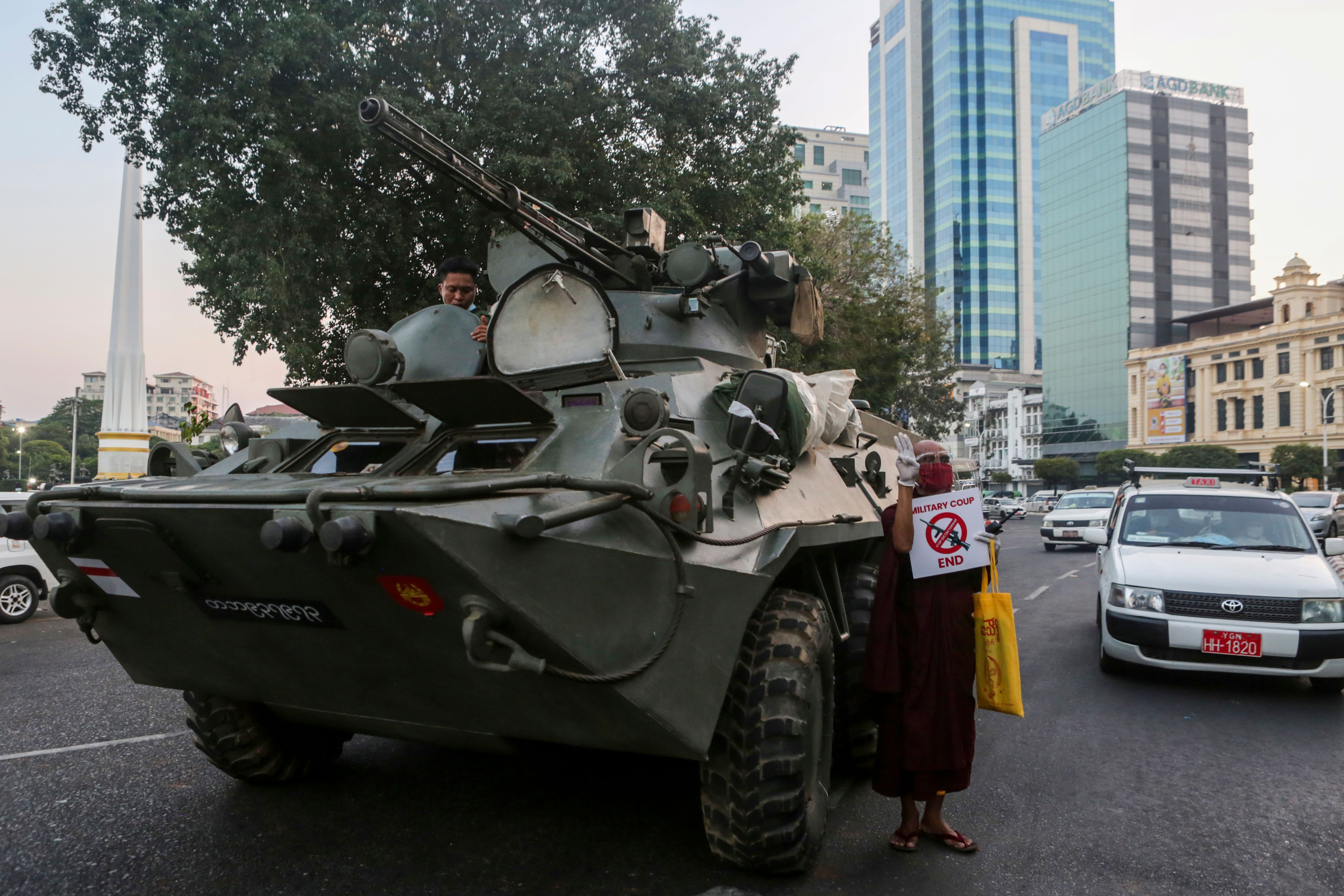An armored vehicle passes to the Sule Pagoda after days of mass protests against the military coup in Yangon on February 14, 2021.
– | AFP | Getty Images
Security forces in Myanmar deployed armored vehicles in major cities and cut off Internet access on Monday after protests against this month’s coup and the arrest of elected leader Aung San Suu Kyi attracted hundreds of thousands of people The streets.
Suu Kyi’s detention on charges of illegal importation of six walkie-talkie radios is set to expire on Monday. His lawyer, Khin Maung Zaw, could not be reached for comment.
Police opened fire to disperse protesters at a power plant in northern Myanmar on Sunday, during the ninth day of anti-coup demonstrations against the February 1 coup, which hampered the country’s provisional transition to democracy.
In addition to mass protests across the country, military officials are facing a strike by government officials, part of a civil disobedience movement that is paralyzing many government functions.
Soldiers were sent to power plants in northern Kachin state, leading to clashes with protesters, some of whom said they believed the army intended to cut electricity.
Security forces fired to disperse protesters outside a factory in the state capital of Kachin, Myitkyina, showed footage streamed live on Facebook, although it is unclear whether they were using rubber bullets or real fire.
On Sunday night, armored vehicles appeared in the commercial capital of Yangon, Myitkyina and Sittwe, the capital of the state of Rakhine, the first large-scale deployment of these vehicles across the country since the coup.
On Monday, more than a dozen police trucks with four water cannon vehicles were positioned near the Sule Pagoda in Yangon, which has been one of the main protest centers in the commercial capital.
The government and army were not immediately available for comment.
Shortly after midnight, Myanmar residents reported an internet crash. All four telecommunications networks were inaccessible at around 1 am on Monday (1830 GMT), they said. In the early days after the coup, the internet was cut off across the country.
Western embassies – from the European Union, the United Kingdom, Canada and 11 other nations – issued a statement late on Sunday calling on security forces to “refrain from violence against protesters and civilians, who are protesting the overthrow of their legitimate government”.
The United States embassy in Myanmar previously asked American citizens to “shelter there,” citing reports from military movements in Yangon. He also warned that there was a possibility of interruptions in telecommunications overnight between 1 am and 9 am
“The shutdown of the Internet in #Myanmar is now in effect again on all major carriers, presumably until 9 am,” said Alex Warofka, product policy manager for human rights and freedom of expression at Facebook, in a post Twitter after the internet went down.
“I hope everyone will be safe tonight amid very worrying reports of military activities. #KeepItOn.”
Civil disobedience
United Nations Secretary-General Antonio Guterres has asked the Myanmar military and police to ensure that the correct peaceful assembly is respected and that protesters are not subjected to reprisals, UN spokesman Stephane Dujarric said in a statement. on Sunday.
“The ongoing arrests of political leaders, government officials, civil society actors and media representatives are deeply worrying, as are restrictions on the Internet and communication services,” he said.
At the last sign of worker disruption, the Civil Aviation Department said in a statement that many employees have stopped working since February 8, causing delays on international flights.
One pilot, who asked not to be identified for fear of retaliation, said hundreds of department employees were on strike. Soldiers surrounded Yangon International Airport on Sunday night, he said.
Trains in parts of the country also stopped running after the team refused to work, local media reported.
The board ordered public officials to return to work, threatening to act. The Army has carried out mass arrests every night and on Saturday it has given itself broad powers to detain people and search private properties.
Richard Horsey, an analyst at the International Crisis Group in Myanmar, said the work of many government departments was effectively stopped.
“This has the potential to also affect vital functions – the military can replace engineers and doctors, but not electrical network controllers and central bankers,” he said.
At least 400 people have been detained since the coup, the monitoring group Association for Assistance to Political Prisoners said.
